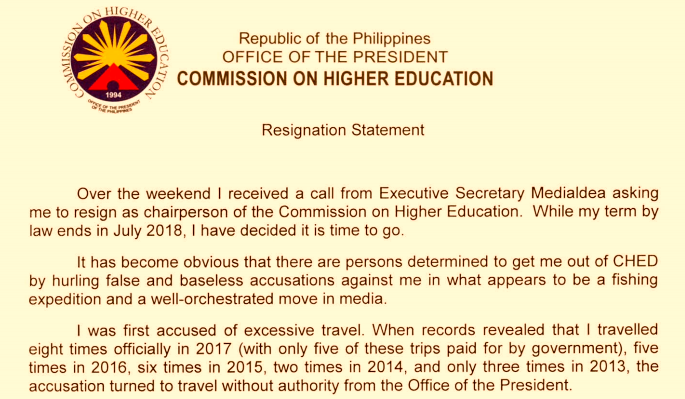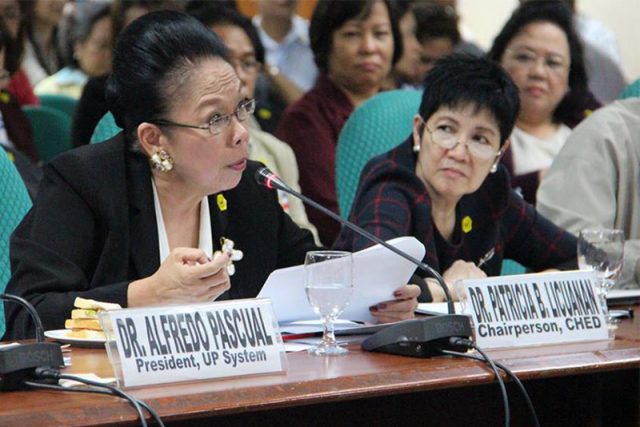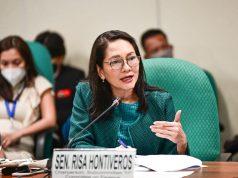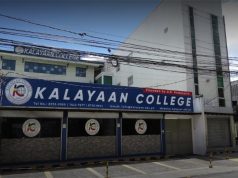The Chairperson of the Commission on Higher Education decided on Monday “it is time to go” after receiving a telephone call from Malacañang asking for her resignation.
In a resignation statement distributed to news outlets, Licuanan related that she received the call over the weekend “from Executive Secretary Medialdea asking me to resign as chairperson of the Commission on Higher Education. While my term by law ends in July 2018, I have decided it is time to go.”
Licuanan stated that it has become obvious “there are persons determined to get me out of CHED by hurling false and baseless accusations against me in what appears to be a fishing expedition and a well-orchestrated move in media.”

She was first accused of excessive travel. “When records revealed that I travelled eight times officially in 2017 (with only five of these trips paid for by government), five times in 2016, six times in 2015, two times in 2014, and only three times in 2013, the accusation turned to travel without authority from the Office of the President.”
She continued: “When my office provided copies of travel papers signed by the Senior Deputy Executive Secretary authorizing me to meet specific commitments in line with CHED’s internationalization mandate and allowing me to travel business class to avoid the recurrence of vertigo, my ability to attend to CHED work for health reasons was maliciously peddled in social media even if I have worked consistently in CHED from 6:45 AM to after 6 PM on most days and took a sick leave only for half a day in 7.5 years in office.
“What I cannot understand is how Rep. Jericho Nograles got hold of my internal travel documents for the past five years. Only a few offices in CHED had access to these. These are internal documents to support the administrative release of funds and while I sign the internal document for my own travels, my signing is always based on an official travel authority from Malacanan. The question is, who put these together and who offered it to the congressman?
“When the travel-related accusations proved baseless, those who are dying to remove me from office then turned to mismanagement and corruption in the release of allowances to faculty scholars in the K to 12 Transition Program.
“The K to 12 Transition Program began in 2016 to prevent massive displacement of higher education faculty and staff, while upgrading the quality of higher education. Admittedly there have been challenges in the release of living allowances, but these were due to 1) discrepancies and deficiencies in documents submitted to CHED; 2) the volume of documents that required thorough vetting and that put the onus of accountability and final review of the documents previously checked by contractual staff on an extremely limited number of staff with plantilla items; and 3) the need to abide by government accounting and auditing rules. Since our effort to fast-track processing last November 2017, the 2,828 scholars who have submitted valid documents have already received their allowances as of today—full allowances for 2,247 scholars and partial allowances for 581 scholars with remaining deficiencies in terms of submission following accounting and auditing rules, In line with the same rules, funds for the 1,268 scholars who have not submitted valid enrollment forms and authenticated copies of grades for the previous semester will be released as soon as these requirements are met.”
Licuanan “strongly” denounced “malicious allegations” of corruption and mismanagement of funds. “It has been my personal commitment to stamp out corruption in CHED since day one, despite the odds and the strong resistance. The K to 12 Transition Program has been implemented with the highest level of ethical stewardship and every peso is accounted for.
“Although I vehemently deny the accusations against me, it is time to resign as my continued presence in CHED is inimical to the interest of the institution.”
She did not want to serve as “lightning rod to attract more controversy that is distracting the agency” from pursuing reforms for the benefit of future generations of Filipinos.
“It is particularly important for CHED to focus on its work especially at this critical time when it prepares for the implementation of Republic Act 10931 or the Universal Access to Quality Tertiary Education Act.
“I am deeply grateful for the rare opportunity to have served Philippine higher education. My only wish is for reforms that ought to transcend political divides and have their roots in many previous administrations – reforms of access and equity, quality and relevance, excellence and competitiveness, and good governance – to continue when the CHED political cloud dissipates and the agency settles down to the task of pursuing its mandate.
“As a private citizen, I intend to continue as a dedicated advocate for reform in Philippine higher education,” she said.
WATCH NEWS5’S VIDEO:










